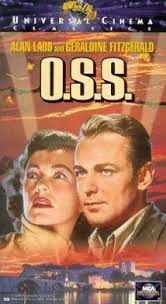
OSS
US, 1946, 105 minutes, Black and white.
Alan Ladd, Geraldine Fitzgerald, Patric Knowles.
Directed by Irving Pichel.
OSS is the organisation founded during World War II which led to the formation of the CIA. The actual OSS collaborated on the making of this film immediately after the end of the war. It presents the American contribution to European Resistance, especially in France, the role of those overseeing the espionage, the characters of those who volunteered to go behind enemy lines. The film is a tribute to these people and is presented in a semi-documentary fashion.
With the subsequent history of the CIA, audiences perhaps will tend to look at this film from a somewhat jaundiced perspective rather than as the rather honourable and straight-minded patriotism that was prevalent at the time.
Alan Ladd fits the central role perfectly and is supported sympathetically by Geraldine Fitzgerald.
1. The film war tributes at the end of World War II? The semi-documentary style? The insight, immediately after the war, into activities in the preceding years?
2. The establishment of the OSS, its control by the American government, its collaboration with other services overseas, its contribution to the Continental Resistance? The personnel giving advice for the film? The subsequent development of the OSS into the CIA?
3. Black and white photography, the opening in the United States, the transition to London? The scenes behind enemy lines in France? The musical score?
4. The opening, John Martin and his testing the security of the firm, his being arrested, his getting rid of the evidence in the suggestion box, it not being sufficient? His being released? Going to the debriefing meeting, the instructor and his explanation of the mistakes made, even to eating in the American style with a fork?
5. The recruitment of the various personnel, John and his arrival, Ellen and her friendship with Commander Brady, his persuading her to become involved? John and Ellen skirting each other on arrival at the building? Finding they were part of the same team? The range of members of the team, the sandy-haired man who could pass as a German, the quiet businessman_? Commander Brady and his explanations?
6. The training of the OSS personnel, what was needed for different personalities, memorising their characters? The adaptation to life in Continental Europe? Pointing out the potential mistakes? The readiness, going to England, the dangers, especially blackouts and bombings in wartime London?
7. Their being dropped behind enemy lines, being received by the French Resistance? Their taking their place as characters? Martin and his being on the move? Ellen and her assuming a friend's personality, being a widow? The attraction of the German commander and the pressure put on him? Her role as a sculptor, having to sculpt a bust of him? Her friends, the local support, the barkeeper? The activities, the messages from London, radio? The nature of the sabotage? The train ride with Ellen and John and the German commander? The blowing up of the tunnel? Their having to escape?
8. The London control, concern, messages? The businessman eating with his fork and being detected and executed? The German look-alike and his going behind German lines?
9. Ellen and John and their trying to escape, the confrontation with the German commander? The agent and his double play, his helping John and Ellen, the confrontation with the German commander?
10. John and his escape, back to England with the German look-alike after his help? Ellen and her having to be left behind, her expected torture and death?
11. The emotional impact of seeing this kind of story, in the retrospect of World War II, in the light of the second part of the 20th century and the growth of agencies and terrorism?